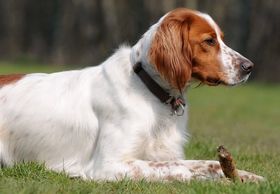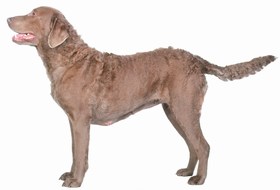
Paws ‘N’ Pups Quickview
Size
| Energy Level
| Trainability
| Paws ‘N’ Pups Rank
|
Characteristics
| Physical Characteristics: Height: 20-24” Weight: 55-75 lbs. Energy Level: Moderate-High | Health & Longevity:12-16 years Breeders screen for the following conditions:
|
The American Kennel Club recognizes the Golden Retriever in the following colors:
White is not recognized, but some breeders have intentionally started breeding for it. |
Unfortunately, cancers are prevalent in the breed. Like many large, deep chested breeds, Goldens are susceptible to gastric torsion (bloat), a life-threatening situation if immediate veterinary intervention is not sought. Epilepsy and allergies are known, as is Osteochondrosis Dissecans (OCD), a painful condition caused by improper growth of the joint cartilage, may require surgical repair. Because of the high number of health problems in the breed, seeking a responsible breeder is of utmost importance; many breed strictly due to the popularity of the Golden, assured an easy sale, with little regard to avoiding health problems.
Temperament & Train-ability
The Golden was developed to be a “gentleman’s hunting companion”, and still retains the many highly desired qualities of a great family dog that have made it so popular. Friendly, sweet, calm and tolerant, Goldens are highly social and very affectionate. They typically are good with children, other dogs and strangers. Their high sociability means they need to be included in family activities; they are members of the family and are not well suited to spending long periods alone. They want to go along camping, hiking, or on a family evening walk. A bored, lonely Golden will likely display destructive behaviors and barking. Often referred to as “Velcro dogs”, your Golden will probably follow you from room to room, perhaps wanting to maintain constant physical contact. If this degree of closeness would annoy you, the Golden is not the breed for you.
Gentle as adults, an adolescent Golden is capable of being fairly rowdy, and often remains playful until 3 or 4 years old; some people find this annoying while others see it as endearing. Goldens retain their retriever instincts, often carrying objects around just because they can. These are large dogs with high exercise needs, and so are not recommended for apartments or condos. They are a good choice for families as well as novice dog owners. Finding a responsible breeder is critical in Goldens; because of their popularity, there are many who produce puppies whose only consideration is the sale. An irresponsibly bred Golden may have an anxious, hyperactive, or even aggressive temperament.
Goldens need a job, whether it’s helping pick up the kid’s toys and dirty socks, playing some fetch, or competing in a dog sport, which they are highly successful in. If you plan to jog with your Golden, wait until their growth is complete, usually around 2 years of age, in order to avoid damaging still-developing joints. In order to realize their genetic potential Goldens need early and ongoing socialization, which should continue until they are 18 months. Intelligent and bred to work with people, training a Golden is usually fairly easy. They are willing, and respond beautifully to positive reinforcement methods. Being sensitive, harsh methods should be avoided, as they are likely to damage your dog’s trust in you.
Due to their desire to be constantly with people, it is necessary to teach a Golden puppy how to be alone in order to avoid him developing separation anxiety. They can be easily distracted, so patience and persistence is helpful during the training process. Unlike some breeds that require great skill, Goldens are fairly forgiving of the mistakes novice owners may make in training. Like other retrievers, Goldens can be mouthy, and usually enjoy a variety of toys. Goldens are very competitive in dog sports, including obedience, agility, tracking, hunt tests, nosework, dock diving and more! They are also very successful as therapy dogs. It is, in fact, rare for a breed to be a top competitor and be suitable for novice dog people; it is a testament to their universal appeal.
Grooming
Goldens sport a dense, water repellent topcoat over a thick undercoat with attractive feathering. Goldens shed a lot, all year long. Twice a year, in the spring and fall, they will shed heavily, and since shedding is extra heavy during this time, brushing needs to be done daily to prevent matting. Feathering should be brushed daily to prevent matting, and the entire dog brushed weekly. The Golden’s coat has higher oil content than most breeds, useful for it’s water-repelling properties. However, this can lead to a somewhat “doggy” smell if not kept clean; occasional baths will keep your Golden fresh. Some Goldens’ coats are straight, while some have some wave. Also, some dogs can be prone to drooling.
Ears must be cleaned regularly, and toenails should be trimmed; even if your Golden wears their nails down, you will want to maintain the ability to handle their feet, especially useful as they age, when wear to the nails typically slows down. Teeth must also be checked and cleaned regularly.
Diet
The amount of food your Golden will need can vary depending on age, activity level, and type of food fed; on average, Goldens will eat about 2-3 cups of food per day, which should be fed in two meals. Free feeding should be avoided, as many Goldens are prone to becoming overweight. If your Golden experiences food-related allergies and sensitivities, some experimentation to find a food your dog can tolerate may be needed. A constant supply of fresh, clean water must always be available.
Looking for a Golden Retriever?
 Find A Golden Retriever Breeder |  Golden Retriever Puppies For Sale |  Adopt A Golden Retriever |
Cost
As with most popular breeds, prices for Goldens have a very wide range, from the $700-$900 range to $1,000-$5,000. Some breeders of white Goldens are charging as high as $10,000-$20,000, using the marketing ploy of “rare” to justify such high prices. Rescue rescue organizations are another option, where lovely dogs needing a home can be found; adoption fees vary widely, but are generally in the $200-$500 range.
Paws ‘N’ Pups Ranking
Paws ‘N’ Pups ranks every breed out of 4 with 1 being easiest to integrate into your life and 4 being the toughest – The lower the ranking the better.
The Golden rates a 2.5; they generally require little skill, and nice dogs can be found for a reasonable cost. However, they do have high exercise requirements, some training needs, and a fair amount of health problems.
Breeds Similar To Golden Retriever
 Gordon Setter |  Flat-Coated Retriever |  Irish Red and White Setter |  Chesapeake Bay Retriever |




